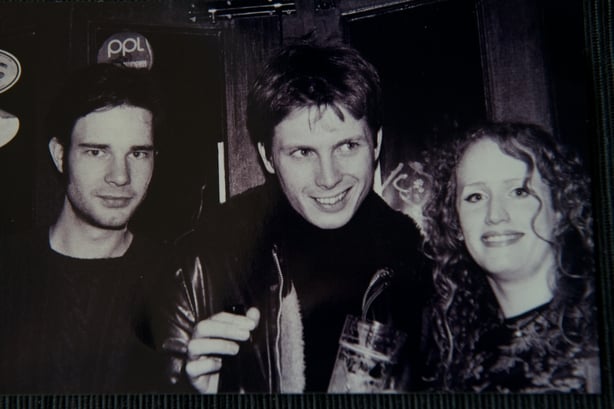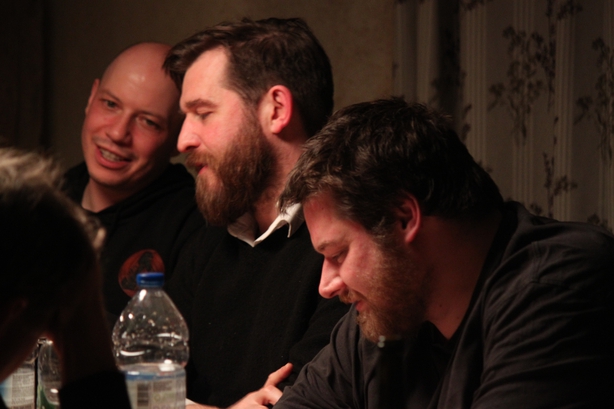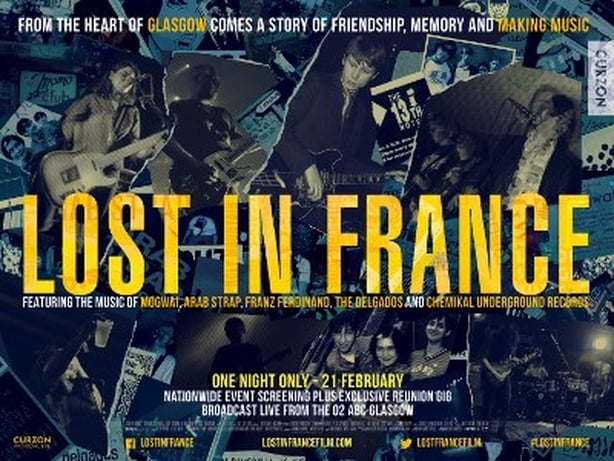Directed by Irish filmmaker Niall McCann, the acclaimed new documentary Lost in France explores the rise of Scotland’s independent music scene in the ‘90s led by cult label Chemikal Underground. Here, Niall writes for RTÉ Culture about his own personal road to redemption.
'You don’t make the film – the film makes you.'
That's a quote from the French filmmaker Jean Luc Godard, it’s always been one of my favourite when it comes to cinema and one that I feel succinctly sums up the strange endeavour of filmmaking – a transformative process that like other art forms dictates itself to its maker as much as the other way round.
To tell this story properly I need to go back, way back, way way back to the end of 2012. At the time I was in a bit of a sorry state. The release of my first film Art Will Save The World which I had spent the previous four or five years putting together costing me all of my bank balance, all of my ideas, my girlfriend and a large chunk of my mind, had been a busted flush. The film was never cleared for any sort of release bar film festivals, and though it was critically well received by audiences and critics alike, I felt ultimately that the last six years or so of my life had been an utter waste of time and a failure. I don’t own the film so it was all, frustratingly, out of my hands. Then to cap it all the relationship I was in at the time fell apart (different girlfriend and all my fault). I was homeless and the upset wrought by my sense of failure and declining mental health turned me into a very selfish and angry person. It would have been more pleasant living with Michael Gove.
Moving back into your parents’ house at 30 is not the most ideal thing you can do. It feels weird and wrong, at best a retreat and at worst a defeat.
With no home and nowhere else to go, I had no option but to move back into my parents’ house in Dundalk, I didn’t know what I was going to do, I was lost and despondent and about as much fun as Mike Pence in The George.
It really is difficult for me to convey how I felt at this time. When you work so hard and give so much of yourself to something, be it a creative pursuit or a relationship or work, and then to see all your effort amount to nothing (which is how I felt at the time) was deeply upsetting and destructive to me personally. As someone who doesn’t need much help with mood issues, I don’t think I’d ever felt so alone and lost, but as always there were people there who pulled out of it and I owe them so much.
Moving back into your parents’ house at 30 is not the most ideal thing you can do. It feels weird and wrong, at best a retreat and at worst a defeat. I had images of myself being that son who is still living with his parents into my fifties and beyond, with relatives referring to me as the special one or the one who should have been a priest. I was for all accounts and purposes nothing more than salad with attitude.
In my teary stupor there was one comfort I found at home, along with the endless support of my long-suffering parents - my old record collection. Since leaving home, the fact I move on average more than once a year meant I had left the majority of my music collection gathering dust in my old room. So in my angst, I turned to that music and in particular the music of the label Chemikal Underground and bands like Mogwai, Arab Strap, the Delgados, Belle and Sebastian, Jesus and Mary Chain, Primal Scream, the list goes on.
Around this time, I had been put in contact with Aidan Moffat, formerly the lead singer of the Scottish band Arab Strap, now a successful solo artist. Aidan had mentioned a trip Arab Strap, Mogwai, an early version of Franz Ferdinand and many other bands I loved from the city of Glasgow all took to a tiny village, Mauron in France, some 20 years ago. There was a half-baked idea for a film rolling around my head, but after the first fiasco it seemed nothing more than a fantasy. Filmmaking is a collective pursuit and at that time it seemed something as further away from me than it ever had done before as I felt completely alone and isolated.

That same year the Cork Film Festival invited me down for a screening of my first film, so I headed down for a few days not expecting much.
While there, I was asked to take part in a panel discussion about helping people realise their first film, and presumably if they took my advice their last.
On the panel with me was the Irish Director/ Producer Nicky Gogan, whose two features at that time: Seaview (about Mosney, and the asylum seekers housed there) and Build Something Modern (which focused on the legacy of Irish Architects who built churches for the Catholic Church in Africa in the mid-20th century) were two of my favourite Irish films. So Nicky and I got talking, and she asked me if I had any ideas for my next film, I blurted out something probably close to gibberish about the idea I had about this trip to Mauron. There and then Nicky said she would help me make it. With a newfound purpose, I slowly started to put myself back together again, piece by piece.
The dawn of the digital age has been in some ways cataclysmic, reducing previously flourishing industries into basket cases.
One year later or so myself and Nicky were sitting around a table with Stewart Henderson, formerly of the band the Delgados, Stuart Braithwaite from Mogwai, RM Hubbert and Arab Strap's Aidan Moffat. At this meeting, I was struck by how down Stewart Henderson was on the legacy of the record label and what they had achieved or not as in his case. His malaise had been brought on by what had happened to the music industry over the last 20 years , and the fact that previously flourishing labels like Chemikal Underground were now on their knees. Simply put, people just don’t buy music anymore. They file share and download music for free - or steal it, to be blunt. Something strange seems to happen to people when they sit behind a computer - the anonymity often brings out the worst in them at times.
The label that gave the world Mogwai and Arab Strap could no longer afford to sign new bands, send artists on tours or take any of the risks which they had previously prided itself on. It dawned on me pretty quickly that Stewart was my way into the story, the story of not just the label, the city Glasgow and its music but also the story of people who had created their own destinies and were now fighting to keep that alive. Their story seemed to me to mirror that of not just musicians or artists but all of us who must exist in a world which at times can seem indifferent to us and in many ways is stacked against us.
I also realised that in order to get the guys reflecting on their lives, I would need to give them space and time away from Glasgow. So the aforementioned Mauron trip, and the concept of taking them back to this tiny little village in Brittany became the foil we would use to achieve this. It seemed to me to be the perfect non-fiction MacGuffin from which we'd get the guys talking. What attracted me to the story of this trip 20 years previously is the normalcy of it; all of us have friends, all of us have grown up and all of us where young at one point. I am not trying to mythologise, or claim it to be this important moment in the history of music in Glasgow, but revisiting it offered me a way of drawing parallels between then and now. We could document clearly the changes that have happened, not just in the music world but in wider society.

return to Mauron 20 years later
So some four years after we first discussed the idea, Nicky and I found ourselves on a bus driving through the French countryside with our group of musicians: Alex, Stuart, Emma, Hubby and Paul Savage. A pretty surreal experience for someone who had grown up on their music.
I remember the filmmaker Paul Tickell telling me that a good film reflects its mode of production, and I was so lucky to have the team of people I did around me. We had a Scottish Co-Producer in Paul Welsh who, like Nicky Gogan, is one of the best producers around, and I cannot thank them enough for their belief in me and help. Filmmaking is a tough thing to do, both economically and emotionally. We could easily see the parallels between the story we were telling and our own lives.
Our story about friends making art against the ever increasing odds doubles up as our own story; without the support of my parents, my girlfriend and Nicky and Paul, there would be no film. Without our friends, there would be no film. The world likes to teach us that we are all separate and alone, but the truth is we’re not - we are strongest when we stand with each other, history teaches us that and all the Daily Mail headlines in the world won’t change it.
In our film we combine the personal with the political, via the story of this label set up by a bunch of friends in the 1990’s who had no money but bags of ambition.
Slowly, this attitude manifested itself in other ways in the film. We discuss how attitudes towards the welfare state and the economy, both on behalf of government and the public, affect the arts. Stewart Henderson speaks in the film about what it was the dole gave to burgeoning artists from the '70’s onwards – specifically time and money, the things that you need to make art.
The dawn of the digital age has been in some ways cataclysmic, reducing previously flourishing industries into basket cases. The internet is about access, it is not about ownership, and while dwindling record sales do not affect artists who are already established and successful, it hampers the ability of smaller or new artists. They are no longer afforded the time or space they need to develop their craft. This portents a bleak and troubling future; a monochrome Mumford and Sons world, with no more bands like Pulp, Oasis and The Stone Roses, no more Factory records, no more Chemikal Undergrounds. The arts reduced to a hobby for all but those who can afford to indulge their whims.
So in our film we combine the personal with the political, via the story of this label set up by a bunch of friends in the 1990’s who had no money but bags of ambition. We could tell the story of a world that has changed utterly in my lifetime and point towards a worrying future - not just for the arts, but for us as a society.
When I met Nicky, she gave me a chance at redemption of sorts and a chance to put right what first went wrong. A bit like Sam in the TV show Quantum Leap, but with low-budget documentaries.
We need to start to give people a chance. A chance to find themselves, their calling, their passion and not just stick them in any old job and tell them they should be grateful to have one. We need to start to think about the sort of society we want, is it one for the few or one for us all.
Our film Lost in France is a clarion call to this cause. A love letter to a lost era, one perhaps we are not quite yet aware we have lost. Like the subjects in my film, we need to keep trying to wrest it back.
As Beckett said: Ever try? Every fail. No matter. Fail again. Fail better.
So you don’t make the film, the film makes you, and your parents, your love, your friends – they do too.

There are special screenings of Lost In France in Dublin, Cork and Galway this weekend, followed by a Q&A session with Niall McCann and live performances from Glaswegian legends Emma Pollock & RM Hubbert - go here for details.


